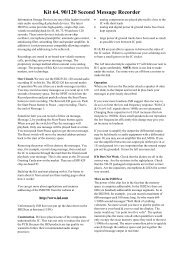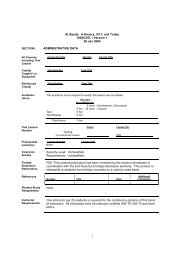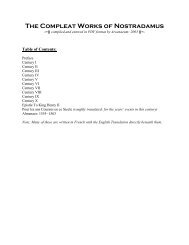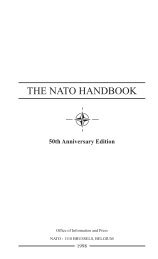Download This File - The Free Information Society
Download This File - The Free Information Society
Download This File - The Free Information Society
You also want an ePaper? Increase the reach of your titles
YUMPU automatically turns print PDFs into web optimized ePapers that Google loves.
associate of McCorkle’s shot a trooper as he drove his car<br />
into the Hughes’ family driveway. <strong>The</strong> person he shot and<br />
wounded was Trooper Michael Hughes, the brother of the<br />
trooper who arrested McCorkle, who was also a Maryland<br />
State Trooper. Through a complex investigation supported<br />
by the DEA-supervised Intelligence Group of the Washington-Baltimore<br />
HIDTA, the task force was able to successfully<br />
link Barrios and McCorkle to the attempted murder.<br />
In May 1997, they and nearly twenty others were incarcerated<br />
for a variety of drug charges, and several were convicted<br />
of attempted murder. <strong>The</strong> investigation continued<br />
until the arrest of McCorkle’s drug supplier in 1999. <strong>The</strong><br />
task force that investigated the murder-drug ring, including<br />
three DEA agents, later received the nation’s prestigious<br />
Top Cop award and were recognized at a White House<br />
ceremony with President Clinton and Attorney General<br />
Reno. David Hughes later became a DEA Special Agent.<br />
Mexico<br />
Between 1999 and 2003, Mexico remained the key transit<br />
country for cocaine en route to U.S. markets, as well as a<br />
significant source country for heroin, marijuana, and methamphetamine<br />
destined for the United States.<br />
Among the most important changes that occurred in Mexico<br />
between 1999 and 2003 was the July 2000 election of President<br />
Vicente Fox-Quesada, ending the 70-year rule of a<br />
single political party in Mexico. President Fox ran on a<br />
platform of restoring public security and putting an end to<br />
corruption. <strong>The</strong> Fox administration made some significant<br />
progress towards those extremely ambitious goals by restructuring<br />
the Attorney General’s office to reduce corruption<br />
and taking action against leaders of significant drug<br />
trafficking organizations. Mexican police and the military<br />
had effected the arrests of significant drug traffickers within<br />
virtually every major drug trafficking organization operating<br />
in Mexico.<br />
As a result of this renewed dedication to fight drug trafficking,<br />
the level of cooperation in the counterdrug area reached<br />
unprecedented levels. <strong>Information</strong> sharing between DEA<br />
and the Government of Mexico was extremely productive<br />
and brought about very positive results in joint enforcement<br />
operations. By 2003, DEA’s relationship with its counterparts<br />
in the Government of Mexico was better than ever.<br />
.<br />
Operation Impunity I and II<br />
(1999-2000)<br />
In September 1999, the Amado Carrillo-Fuentes drug trafficking<br />
organization suffered a big hit when DEA and its counterparts<br />
arrested three of its major cell heads and 90 of its members. <strong>The</strong><br />
arrests disabled all facets of their organization—the group’s<br />
headquarters in Mexico, the U.S. cell heads, the drug and money<br />
transportation systems, and the local distribution groups. As a<br />
result of Operation Impunity, 12,434 kilos of cocaine and more<br />
than 4,800 pounds of marijuana were seized, along with $19<br />
million in U.S. currency and another $7 million in assets. <strong>The</strong><br />
Amado Carrillo-Fuentes organization had operated without fear<br />
of capture or prosecution in the United States, believing that<br />
only their low-level operatives were at risk. Operation Impunity<br />
effectively demonstrated that even the highest level drug traffickers<br />
based in foreign countries could not conduct drug operations<br />
inside the U.S. with impunity.<br />
Operation Impunity II continued to target the Amado Carrillo-<br />
Fuentes organization and concluded in December 2000 with the<br />
arrest of 155 individuals, the seizure of 5,490 kilograms of cocaine,<br />
9,526 pounds of marijuana, and $11 million in U.S. currency.<br />
Those arrested faced a variety of federal charges for<br />
their involvement in smuggling thousands of pounds of cocaine<br />
and marijuana from Mexico across the Southwest Border<br />
into Texas. Some of the defendants arrested during Operation<br />
Impunity II were organization leaders who replaced those arrested<br />
in the previous investigations. <strong>The</strong> three phases (Operation<br />
Limelight in 1996 was the first phase) clearly demonstrate<br />
the tenacity of some trafficking organizations and the need for<br />
law enforcement to continuously investigate groups that are<br />
large and well-established.<br />
Colombia<br />
By the mid-1990s, Colombian law enforcement began targeting<br />
leaders of the Cali cartel based on extensive investigation by<br />
DEA. <strong>The</strong> arrests or surrenders of six top Cali leaders during<br />
the summer of 1995 marked the beginning of the decline of the<br />
Cali cartel.<br />
40<br />
Although some elements of the Cali cartel continued to play an<br />
important role in the world’s wholesale cocaine market, they no<br />
longer dominated the international cocaine trade.<br />
Following the dismantling of the Cali cartel, experienced traffickers<br />
who had been active for years, but who worked in the<br />
shadow of the Cali drug lords, seized the opportunity and increased<br />
their role in the drug trade. However, unlike their cartel<br />
predecessors, the Colombian cocaine trafficking groups of the<br />
late 1990s and early 2000s were decentralized and typically specialized<br />
in one aspect of the cocaine industry. No one group of

















